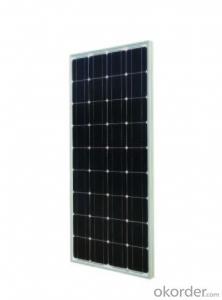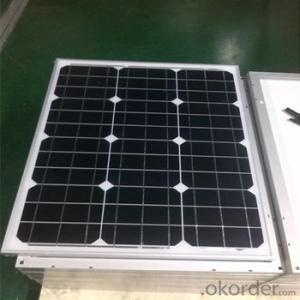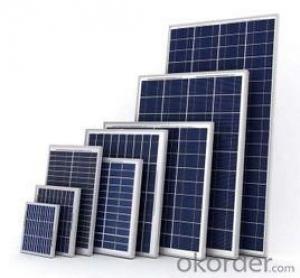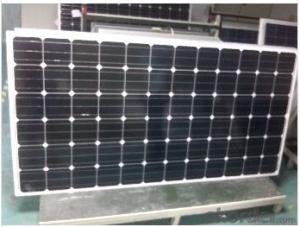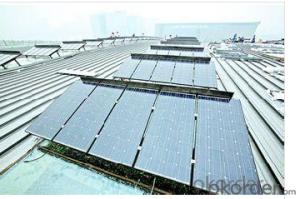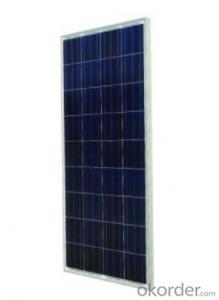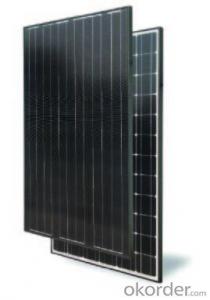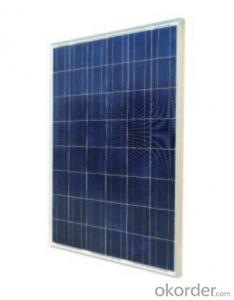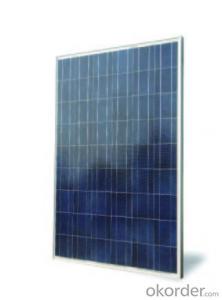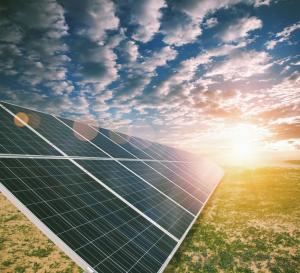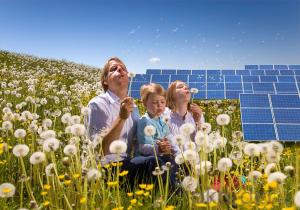Its Solar Panels Poly Crystalline Solar Panel RS100M(B)-36
- Loading Port:
- China main port
- Payment Terms:
- TT OR LC
- Min Order Qty:
- 2000 watt
- Supply Capability:
- 1000000 watt/month
OKorder Service Pledge
OKorder Financial Service
You Might Also Like
Quality Assurance
10 Years Material & Craft
Power Guarantee
12 Years 90% Output
25 Years 80% Output
ISO9001:BSI
ISO14001:BSI
OHSAS18001:BSI
High Module Efficiency
Mechanical Load Capability up to 8000 Pa
Salt Mist Corrosion Protect Ammonia Resistance
Potential Induced Degradation Free
RS100M(B)-36
RS90M(B)-36
RS95M(B)-36
RS105M(B)-36
RS110M(B)-36
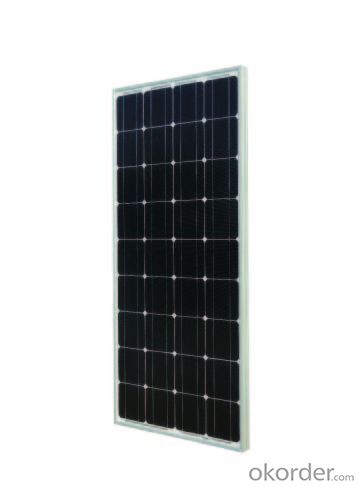
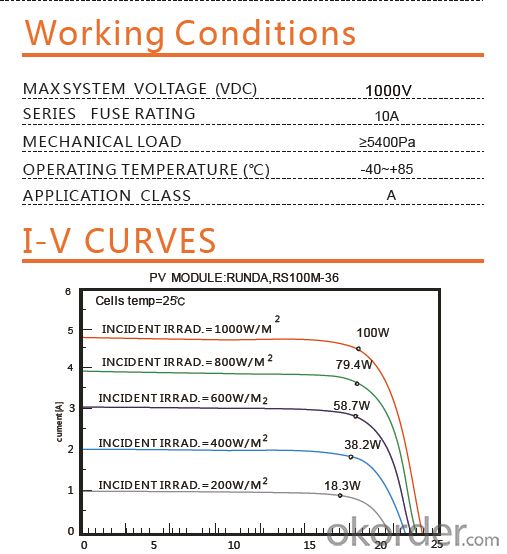
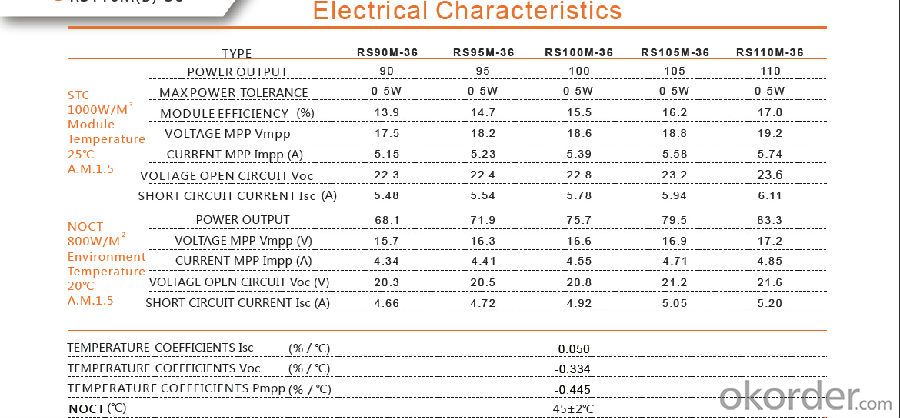
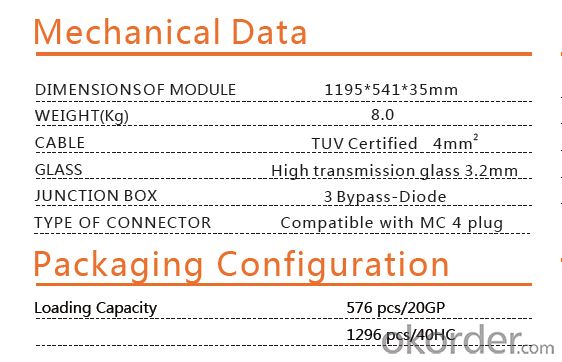
Structure of Solar Panels Description
Solar panel refers either to a photovoltaics (PV) panel, a solar hot water panel, or to a set of solar photovoltaics panels electrically connected and mounted on a supporting structure. A PV panel is a packaged, connected assembly of solar cells. Solar panels can be used as a component of a larger photovoltaic system to generate and supply electricity in commercial and residential applications. Each panel is rated by its DC output power under standard test conditions, and typically ranges from 100 to 320 watts. The efficiency of a panel determines the area of a panel given the same rated output – an 8% efficient 230 watt panel will have twice the area of a 16% efficient 230 watt panel. There are a few solar panels available that are exceeding 19% efficiency. A single solar panel can produce only a limited amount of power; most installations contain multiple panels. A photovoltaic system typically includes a panel or an array of solar panels, an inverter, and sometimes a battery and/or solar tracker and interconnection wiring.
Efficiencies
Depending on construction, photovoltaic modules can produce electricity from a range of frequencies of light, but usually cannot cover the entire solar range (specifically, ultraviolet, infrared and low or diffused light). Hence, much of the incident sunlight energy is wasted by solar modules, and they can give far higher efficiencies if illuminated with monochromatic light. Therefore, another design concept is to split the light into different wavelength ranges and direct the beams onto different cells tuned to those ranges. This has been projected to be capable of raising efficiency by 50%. Scientists from Spectrolab, a subsidiary of Boeing, have reported development of multijunction solar cells with an efficiency of more than 40%, a new world record for solar photovoltaic cells. The Spectrolab scientists also predict that concentrator solar cells could achieve efficiencies of more than 45% or even 50% in the future, with theoretical efficiencies being about 58% in cells with more than three junctions.
FAQ of Solar Panels
Q1:Can we visit your factory?
A1:Sure,welcome at any time,seeing is believing.
Q2:Which payment terms can you accept?
A2:T/T,L/C,Moneygram,Paypal are available for us.
Q3:How to guarantee the Quality of the products?
A3:We have established the international advanced Quality management system,every link from raw material to final product we have strict Quality test;We resolutely put an end to unQualified products flowing into the market. At the same time, we will provide necessary follow-up service assurance.
- Q: do solar panels create electricity from the ultraviolet light created from the sun? because they only have an efficientcy of like 8% and this scientist found out a way to collect the visible light also, and he says the solar panel could have an effeciency of up to 80%! so my question really is, do solar penels creat electricity from heat? do you know of anything that can?
- They create electricity from light energy provided by the sun....
- Q: if so, would it be possible to make (or remake) an organism that could subsist off of sunlight and external heat like plants?
- Plants and algaes and cyanobacteria already exist. What exactly do you want?
- Q: Can solar panels be used in areas with high levels of drought?
- Yes, solar panels can be used in areas with high levels of drought. Solar panels do not require water to generate electricity, so they can still function effectively in dry conditions. In fact, the high levels of sunshine often associated with drought-prone areas can actually make solar panels more efficient.
- Q: Can solar panels be used in commercial buildings or industrial settings?
- Yes, solar panels can definitely be used in commercial buildings or industrial settings. In fact, they are increasingly being installed in such settings because of their numerous benefits. Solar panels not only help businesses reduce their carbon footprint and contribute to sustainability goals, but they also provide long-term cost savings by generating renewable energy and reducing electricity bills. Many commercial and industrial buildings have large rooftops or open spaces that are ideal for solar panel installations, allowing them to harness the sun's energy efficiently. Additionally, businesses can take advantage of various incentives and government programs that promote the adoption of solar energy, making it a viable and attractive option for commercial and industrial sectors.
- Q: Can solar panels be used for powering a water treatment plant?
- Yes, solar panels can be used to power a water treatment plant. Solar energy can be converted into electricity to run the necessary equipment and processes involved in treating water, making it a sustainable and environmentally friendly option for powering such facilities.
- Q: Got a small project here in a remote location. There is to be a 2 volt deep cycle battery, the equipment to be powered from battery and solar panel to charge battery. The 2 volt battery puts out 55 AH. the max constant power draw from the equipment to be powered is 7.9 watts. Will a 30 watt panel at 2 volts be enough to run this system during sunlight and charge the battery for the equipment to run overnight?And, at 55 AH, how long can I keep a constant draw of 7.9 watts without a recharge?Thanks to all the input!
- Create okorder /
- Q: What is the role of inverters in solar panel systems?
- The role of inverters in solar panel systems is to convert the direct current (DC) electricity generated by the solar panels into alternating current (AC) electricity that can be used to power homes and businesses. Inverters are essential components as they ensure the compatibility of solar power with the electrical grid and allow for the efficient utilization of solar energy.
- Q: I am planning to run a couple of dc motors on solar current. I have a couple of 450mA 4V, 200mA .5V, 00mA 9V solar panels with me. I need to run a pair of .5A 9V motors. Suggest me a circuit along with other equipments I might require. For your info, I am trying to build a solar powered drone / UAV
- I don't think it is enough solar power. Your motor requires .5A x 9V = 3.5 watts. The solar cells are .450A x 4V x 2ea. = 3.6 watts, .2A x .5V = .3 watts, .A x 9V = .9 watts total solar = 4.8 watts. The problem with connecting the cells in series to get the right voltage, like the two 4V cells in series with the .5 volt cell (total 9.5 volts) is that the .5 volt cell limits the maximum current to only 0.2A. If you paralleled that with the 9V cell, you would get 9 volts at 0.2 + 0. = 0.3A, too low to operate the motor at its design current and voltage. The best you could do is put the two 4V cells in series, and in parallel with the 9V cell (a blocking diode might be a good idea, but probably not required for such a small array). That way you get 8 volts at 0.55 amps.
- Q: Can solar panels be used to power a waste management facility?
- Yes, solar panels can be used to power a waste management facility. Solar panels can generate electricity by converting sunlight into usable energy, and this energy can be utilized to power various operations and equipment within a waste management facility, including waste processing machinery, lighting, ventilation systems, and administrative functions. By using solar power, waste management facilities can reduce their reliance on traditional energy sources, lower operational costs, and contribute to a cleaner and more sustainable environment.
- Q: My dad owns a restaurant, and we are doing farely well, but we were thinking on installing solar panels to minimize electricity costs (and of course make it greener). My dad would like to hear some numbers on the price in today (August 29/202) and savings he could possibly make over the years. So In Total Here's What I'm Asking:) Would it be hard to install?2) Maintanence?3) Monthly Expense? (None?)4) Price?5) Savings over time?6) Pros/ConsThank you so much!
- Different solar companies install these panels. Check your local area for a free quote. If you don't already have a solar panels for a hot water system yet, consider a thermosiphon design, then you need no electricity to produce hot water. All the other designs require some electricity.
Send your message to us
Its Solar Panels Poly Crystalline Solar Panel RS100M(B)-36
- Loading Port:
- China main port
- Payment Terms:
- TT OR LC
- Min Order Qty:
- 2000 watt
- Supply Capability:
- 1000000 watt/month
OKorder Service Pledge
OKorder Financial Service
Similar products
Hot products
Hot Searches
Related keywords
